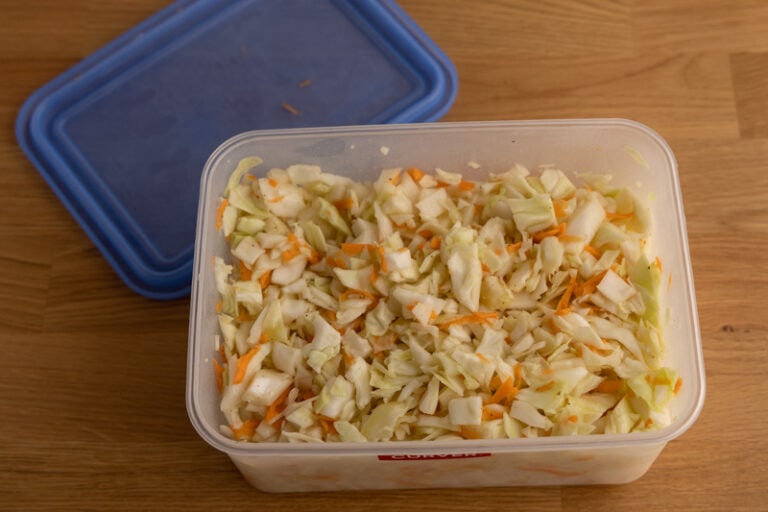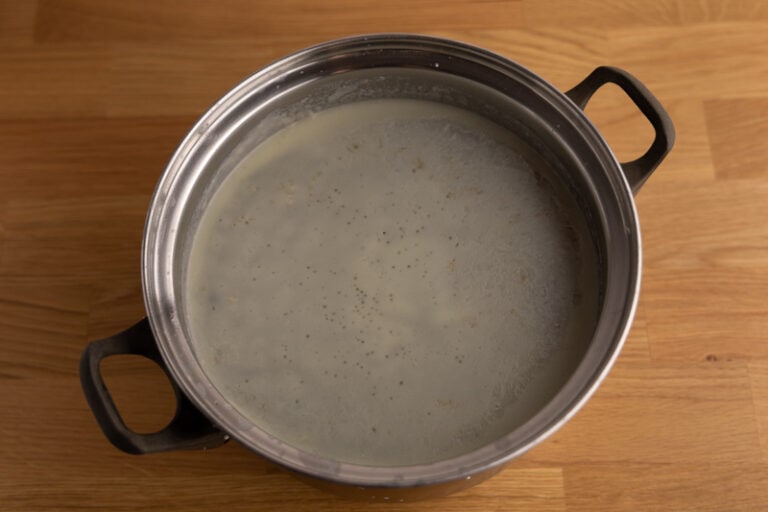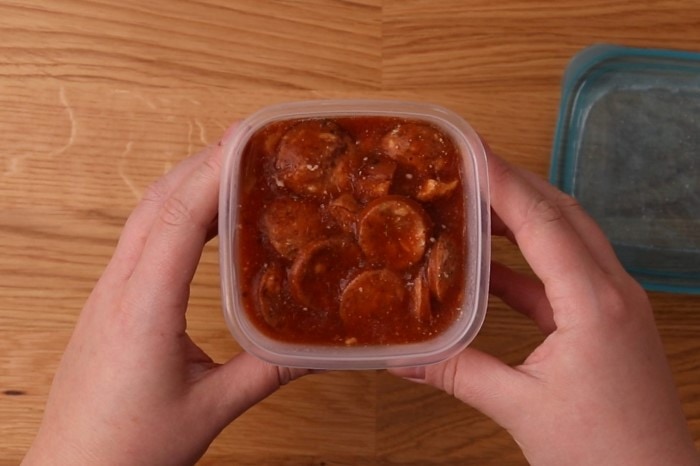Does Kimchi Go Bad?
Here’s all you need to know about the shelf life, storage, and spoilage of kimchi. Learn if kimchi ever goes bad, how long it lasts, and what’s the best way to store it.
You’ve bought a jar of kimchi for the first time, opened it, and had some as a side dish a couple of times. And after a couple of days, you started wondering: does kimchi go bad?
Or maybe kimchi is a regular guest on your menu, but you never really learned how long it lasts. And now you’re looking for a quick primer on the shelf life of kimchi.
Either way, if you have any questions regarding storage, shelf life, or going bad of kimchi, that’s what this article is all about.
For starters, let’s briefly cover the differences between pasteurized and unpasteurized kimchi so that you know what you are dealing with.
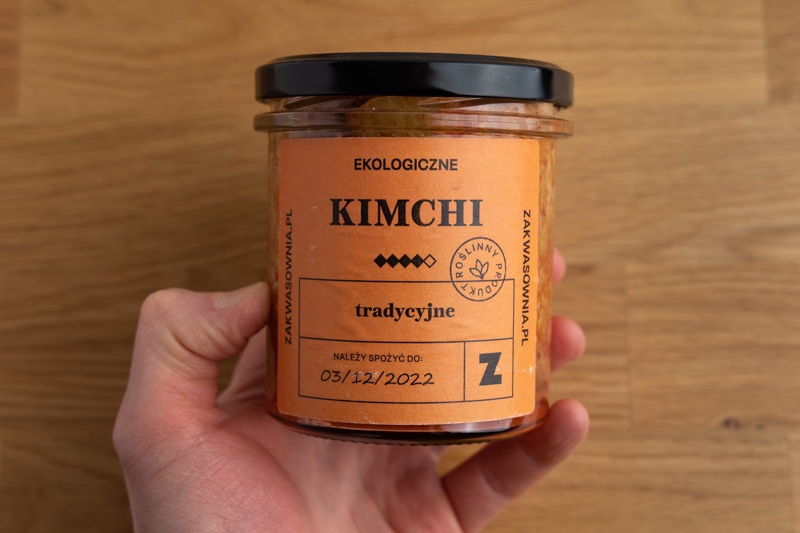
Pasteurized vs. Unpasteurized
Kimchi is a popular Korean side dish of salted and fermented cabbage and other veggies.
Traditionally, kimchi is made in huge earthenware vats buried in soil, but nowadays, it’s usually fermented in mason jars at room temperature or slightly below.
(The production process is quite similar to that of sauerkraut.)
In most cases, kimchi is sold unpasteurized. That means the beneficial bacteria in the jar are still active, and the fermentation process is ongoing.
Unpasteurized kimchi sits in the refrigerated section of the supermarket. The low temperature keeps the fermentation in check, slowing it down.
On the other hand, pasteurized kimchi doesn’t require refrigeration because the heat treatment kills all the bacteria, so the fermentation process stops.
Sometimes, pasteurized kimchi is also kept in the refrigerated section. It’s not there because it has to, but because it’s easier for the buyers to find all the kimchi in one spot.
In other words, read the label to make sure if your kimchi is pasteurized or not. And if you’re buying it for the health benefits, make sure you choose unpasteurized kimchi with live bacteria.
Below, I’ll focus on the more popular option – unpasteurized kimchi. However, I also added a section covering everything about pasteurized kimchi, in case that’s what you have on hand.
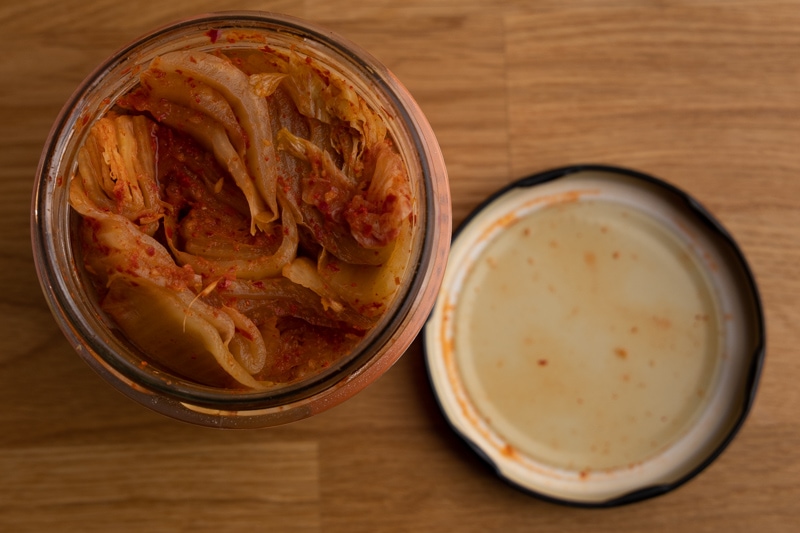
How to Store Kimchi?
Store kimchi sealed tightly in the fridge. You could leave it at room temperature for a few days, but the resulting fermented product would be very sour, and the jar might explode like champagne upon opening.
Once you open the jar, first and foremost, remember to keep it sealed tightly when not in use.
Second, as with pickles and sauerkraut, ensure all the veggies are covered in liquid so they don’t dry out and grow mold on the surface.
Related: Do Pickles Need to Be Refrigerated?
If you can’t use the original packaging, any airtight container or mason jar should work. Just make sure you also transfer all the liquid and that the veggies are submerged in it.
Last but not least, always use clean utensils when scooping the veggies from the jar.
While kimchi is quite acidic and will likely kill most bacteria that could get in there, there’s no point in testing if this actually works.
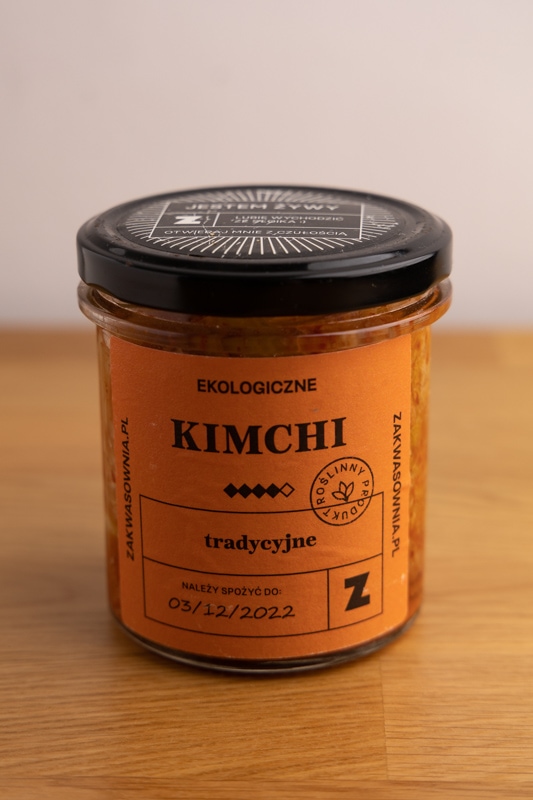
Kimchi That’s Not Sour Enough
If you’ve opened a jar of kimchi and didn’t find it sour enough for your liking, you can fix that easily.
To do so, let the sealed jar sit in the sink overnight and put it back into the fridge in the morning. You should find the contents of the jar tastier the next day.
If the flavor is not there yet, feel free to repeat the process until you’re happy about the results.
You might be wondering why you should put the jar or container in the sink.
The reason is bacteria might go crazy with bubbles overnight and make the jar release liquid when you’re not looking. Letting the jar sit in the sink (or a bowl) simplifies the cleanup if that happens.
(Unfortunately, this doesn’t work for pasteurized kimchi because there’s no ongoing fermentation.)
Does Kimchi Need to Be Refrigerated?
Kimchi doesn’t require refrigeration if you consume the entire bag or jar within a week or so of buying. Otherwise, refrigeration is highly recommended because it allows you to store the fermented product for months without going too sour.
In other words, it’s a matter of how long it’ll take you to go through the bag and whether you mind kimchi that’s sourer than usual.
Each kimchi supplier has their own process that ensures all their products taste the way they do. Sure, there are some subtle flavor differences between batches, but overall each bag you buy should taste similar to the next from the same company.
That process includes the amount of time kimchi is fermented at warm temperatures.
So by leaving kimchi at room temperature, you prolong the rapid fermentation period, changing the product’s flavor. But if you refrigerate it, fermentation slows down significantly, and the taste stays pretty much the same for a couple of months.
When in doubt, refrigerate.

How Long Does Kimchi Last?
Kimchi retains quality for about a week if you leave it at room temperature and for at last 3 to 6 months if you keep it refrigerated and the veggies submerged in brine.
Store-bought kimchi usually comes with a best-before or use-by date. Depending on the producer and ingredients, its suggested shelf life is usually between 8 months and a year.
That date is provided not because the fermented veggies will go bad but because even when stored in the fridge, the fermentation slowly proceeds.
That means that kimchi becomes stronger over time, and around the printed date, it might get to the point it’s too sour for some people.
Obviously, that date is a rough estimate, and when your kimchi becomes too sour for your taste buds is a matter of personal preferences. Nevertheless, it should be acceptable for at least a couple of months past its date.
Opening the jar doesn’t really change anything in terms of shelf life if you follow the storage guidelines provided above.
To sum things up, adequately stored kimchi will last months, but its taste will gradually strengthen. Because of that, finishing the veggies before or slightly after the date on the label makes perfect sense.
| Pantry | Fridge | |
|---|---|---|
| Kimchi (unpasteurized) | Use-by + 1 – 3 months | |
| Kimchi (pasteurized, unopened) | Best-by + 1-3 months | |
| Kimchi (pasteurized, opened) | 4 days or check the label |

How to Tell if Kimchi Is Bad?
Signs of spoiled kimchi include:
Generally speaking, if stored properly, kimchi doesn’t go bad, it just ripens.
When kimchi ripens, the flavor becomes sourer. But that doesn’t mean it is no longer edible. On the contrary, it’s still edible even when it’s super sour.
If kimchi is too sour for your taste, you can use it in stir-fries and stews.
As time goes by, the cabbage can lose its crunch, and that’s perfectly normal too. If that happens, once again, try using the kimchi in dishes that don’t depend on that crunch to taste great. Or simply cook or sautée it.
If the vegetables are too sour, you can use them in one of the mentioned ways, or discard them for quality purposes. It’s up to you.
Pasteurized Kimchi
An unopened jar of pasteurized kimchi typically keeps for a couple of months after the best-by if you store it in a cool place away from sunlight and heat sources.
Once opened, you should store the fermented food in the fridge, where it should last for 3 to 4 days, maybe longer, depending on what the seller says.
The shelf life of open pasteurized kimchi is pretty limited compared to “fresh” kimchi. That’s because there’s no fermentation that keeps the veggies safe.
Sure, the brine has salt and perhaps some vinegar, so the cabbage and other veggies will likely last longer than the typical 3 to 4 days recommended for leftovers. Still, it’s highly unlikely to keep for months without going bad.
(It’s not like the fermented veggies are submerged in vinegar, which lasts indefinitely.)
Knowing that, I recommend going with the producers’ recommendation regarding storage time after opening the container. And if there’s no info on the label or you have already discarded it, use up the kimchi within 3 to 4 days of opening.
Kimchi Shelf Life and Spoilage Summary
Thank you for reading this guide on kimchi. Let’s recap what we’ve talked about above:
- Does kimchi go bad? Kimchi can go bad, and you should toss it if it grows mold, develops an off odor, or gets too sour for your liking. That said, kimchi lasts months after opening if you store it properly.
- How long does kimchi last? Kimchi keeps quality for about a week at room temperature and more than a few months if refrigerated. The date printed on the label is an okay estimate of how long it takes for the product to go too sour for most people’s liking.
- How to store kimchi? You should refrigerate kimchi at all times so that it lasts as long as possible without going too sour. Make sure the container or jar is sealed tight, and all the veggies are submerged in brine so they don’t grow mold.
- How to go about pasteurized kimchi? Pasteurized kimchi doesn’t require refrigeration until you open the jar. Once open, you should keep the leftovers in the fridge and use them within a couple of days. Read the label for the exact details on storage time after opening.
Rotten Records: Share Your Snap!
Caught some food past its prime? Upload your photo to “Rotten Records” and help others spot the signs of spoilage. Every image makes our food community safer and more informed!

